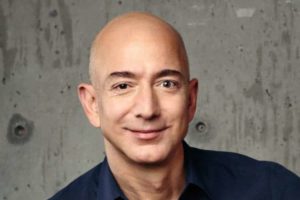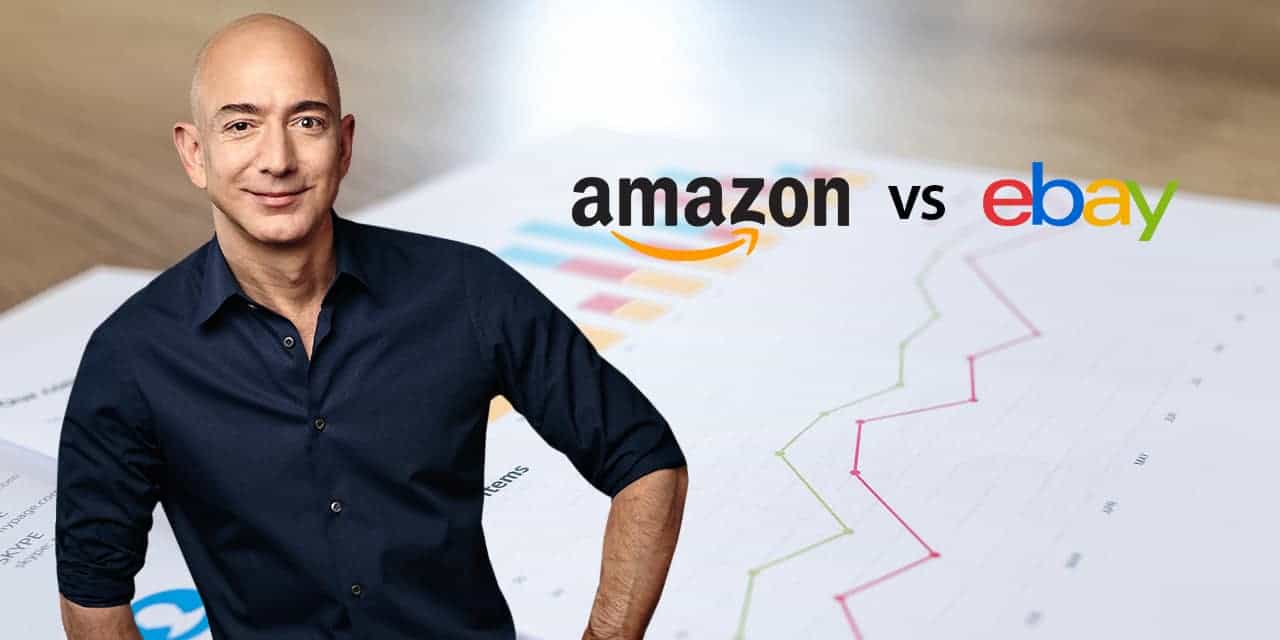Jeff Bezos Compares Amazon’s Business Growth with eBay’s
“Third-party sellers are kicking our first party butt. Badly.”
This was how Amazon CEO Jeff Bezos started his annual letter to stakeholders.
He held third-party sellers accountable for the 58% increase in physical gross merchandise sales on the Amazon marketplace from 3% 20 years ago. He stated in his letter that the total value of merchandise sold by small and medium-sized independent businesses increased from $0.1 billion in 1999 to $160 billion in 2018, which is a compound annual growth rate of 52%.
 On the other hand, the online retail giant’s first-party business saw a 25% compound growth rate, growing from $1.6 billion to $117 billion in the same period.
On the other hand, the online retail giant’s first-party business saw a 25% compound growth rate, growing from $1.6 billion to $117 billion in the same period.
Bezos also alluded to eBay’s gross merchandise sales in that period, which grew at a compound rate of 20%, from $2.8 billion to $95 billion. Clearly, it was to get his point across with respect to Amazon’s role in the success of smaller businesses.
Why sellers did better on Amazon than on eBay
After showing the stark contrast between both companies’ business growth, Bezos cited the selling tools which Amazon invested in as the main reason why independent sellers did better on Amazon’s marketplace than on eBay’s.
He even made special mention of Fulfillment by Amazon and Prime, saying both programs have improved customers’ shopping experience with third-party sellers.
“We invested in both of these programs at significant financial risk and after much internal debate. We had to continue investing significantly over time as we experimented with different ideas and iterations. We could not foresee with certainty what those programs would eventually look like, let alone whether they would succeed, but they were pushed forward with intuition and heart, and nourished with optimism.” – Jeff Bezos, CEO, Amazon
 The head honcho also grabbed the opportunity to snipe at his critics who have called him out many times for the poor working conditions of his employees. After raising the minimum wage of Amazon workers, regardless of the nature of their employment, to $15 an hour last year, Bezos wants to see his competitors do the same, so he deliberately challenged them and wrote:
The head honcho also grabbed the opportunity to snipe at his critics who have called him out many times for the poor working conditions of his employees. After raising the minimum wage of Amazon workers, regardless of the nature of their employment, to $15 an hour last year, Bezos wants to see his competitors do the same, so he deliberately challenged them and wrote:
“Today I challenge our top retail competitors (you know who you are!) to match our employee benefits and our $15 minimum wage. Do it! Better yet, go to $16 and throw the gauntlet back at us. It’s a kind of competition that will benefit everyone.”
Are you an independent seller on the Amazon marketplace? If so, how has your experience been so far? Share it with us in the comments below or join our Facebook Group.
If you liked this article and would like to engage with other small business entrepreneurs selling on marketplaces, join our [the_ad id=”41560″ inline =”1″]. You can also find us on [the_ad id=”41579″ inline =”1″], [the_ad id=”41573″ inline =”1″], [the_ad id=”41575″ inline =”1″], and [the_ad id=”41577″ inline =”1″] or sign up for our newsletter below.
SIGN UP. BE INSPIRED. GROW YOUR BUSINESS.
We do not sell your information. You can unsubscribe at any time.
Dave Furness
Dave is a Co-Founder of eSeller365. For over 10 years he has been involved with eCommerce with a particular interest in the marketplaces and the huge opportunities available for sellers when utilizing a multi-channel strategy. After a year of being the UK’s youngest eCommerce consultant, he built an education platform called UnderstandingE that showed the world how to utilize Magento as the “Third Generation of Multi-Channel software”.
Dave has also created a YouTube channel dedicated to entrepreneurship and eCommerce as well as a podcast dedicated to mental health awareness. When Dave isn’t working his main interests include learning and playing Chess, researching the Crypto and NFT space, and trying to find the nearest beach.

